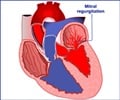
"While there has been previous research of seasonal impacts on cardiovascular disease, there has not been any data about the effect of the lunar cycles on cardiac cases, until now," said senior author Frank Sellke, M.D., chief of cardiothoracic surgery and co-director of the Cardiovascular Institute at Rhode Island, The Miriam and Newport hospitals. "We focused the study on patients having aortic dissection and found that the odds of dying following this procedure were greatly reduced during the waning full moon, and that length of stay was also reduced during the full moon."
Researchers studied the relationship of lunar cycles and seasonal variation on two surgical groups: Group A: Patients having repair of ascending aortic dissection, and Group B: Patients having aortic dissection and either aortic valve surgery, coronary bypass surgery, or both. They also studied the relationship of the lunar cycle on patients' length of stay. The study indicates that aortic dissection performed during the full moon phase had a significantly shorter length of stay than two other moon phases – 10 days for the full moon cycle vs. 14 days for the other phases.
"Can we always plan for such procedures to be performed around lunar cycles? Of course not," Sellke said. "But better understanding the effects of the environment – including seasonal and lunar cycles – on our health can help us to better understand these rhythms, and ultimately provide better care for our patients."
Source-Eurekalert













